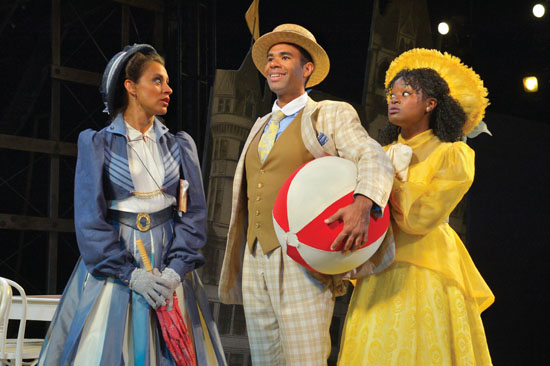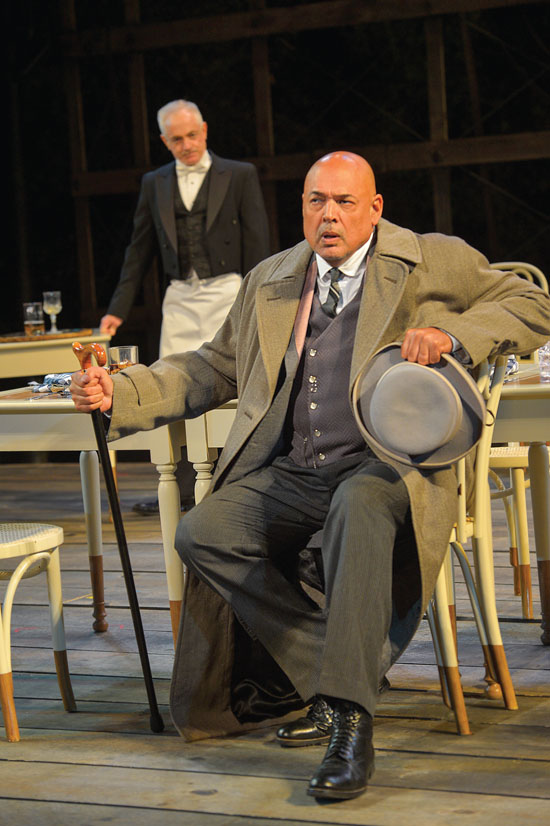|
|
Published August 24th, 2016
|
Cal Shakes' 'You Never Can Tell' Blurs Lines and Challenges Social Codes
|
|
| By Sophie Braccini |
 |
| From left, Sabina Zuniga Varela as Gloria, Lance Gardner as Philip, and Khalia Davis as Dolly. Photos Kevin Berne |
By assembling a joyful and unexpected cast and by moving the action from England to California, director Lisa Peterson has turned George Bernard Shaw's 1897 historically marked play "You Never Can Tell" into a relevant and interesting piece of entertainment.
 Shaw wrote "You Never Can Tell" in 1897 three years after British writer and public speaker Sarah Grand coined the term "New Woman." According to Dr. Andrzej Diniejko, an English Literature and Culture scholar at Warsaw University, the "Woman Question" became a vital issue in British newspapers and periodicals in the 1880s and 1890s. It was a time of changes in the law, as the Married Women's Property Acts of 1870 had allowed married women to retain and control their earned income, and in 1882 they had gained the right to own and control their property. The New Woman was intelligent, educated, emancipated, independent and self-supporting. She was also caricatured, usually pictured riding a bicycle in bloomers and smoking a cigarette.
Shaw wrote "You Never Can Tell" in 1897 three years after British writer and public speaker Sarah Grand coined the term "New Woman." According to Dr. Andrzej Diniejko, an English Literature and Culture scholar at Warsaw University, the "Woman Question" became a vital issue in British newspapers and periodicals in the 1880s and 1890s. It was a time of changes in the law, as the Married Women's Property Acts of 1870 had allowed married women to retain and control their earned income, and in 1882 they had gained the right to own and control their property. The New Woman was intelligent, educated, emancipated, independent and self-supporting. She was also caricatured, usually pictured riding a bicycle in bloomers and smoking a cigarette.
 It is in that context of the social questioning that followed the Victorian era that Shaw presented the play, where a mother has left her husband and raised her three children alone, with modernistic ideas of earnestness, independence and the right of making their own decisions. She returns home with them now almost grown and through a series of coincidences, is reunited with her former husband.
It is in that context of the social questioning that followed the Victorian era that Shaw presented the play, where a mother has left her husband and raised her three children alone, with modernistic ideas of earnestness, independence and the right of making their own decisions. She returns home with them now almost grown and through a series of coincidences, is reunited with her former husband.
 The first part of the play sets the situation in place and revolves around a young, charming and penniless dentist, a bit of a charlatan too, and his encounter with the Clandon family. The mother is a renowned New Woman writer, her older daughter Gloria is following in her footsteps, while the two younger siblings, Dolly and Philip, are very bright and free spirited. By the time of the intermission, the situation is well established and the missing figure of the father has been introduced.
The first part of the play sets the situation in place and revolves around a young, charming and penniless dentist, a bit of a charlatan too, and his encounter with the Clandon family. The mother is a renowned New Woman writer, her older daughter Gloria is following in her footsteps, while the two younger siblings, Dolly and Philip, are very bright and free spirited. By the time of the intermission, the situation is well established and the missing figure of the father has been introduced.
 The second part reveals the full flavor of Shaw's humor and depth. A more fast-paced part, it develops the interesting social and humanistic questions Shaw raises with this play: can a woman, or a man for that matter, retain the fullness of her or his self-determination within the institution of marriage? Can a father and a son still connect after the latter has risen way above his father's social standing? Is trust and respect built into fatherhood or does it have to be earned? Shaw seizes the essence of a world that is rapidly changing and where "you never can tell."
The second part reveals the full flavor of Shaw's humor and depth. A more fast-paced part, it develops the interesting social and humanistic questions Shaw raises with this play: can a woman, or a man for that matter, retain the fullness of her or his self-determination within the institution of marriage? Can a father and a son still connect after the latter has risen way above his father's social standing? Is trust and respect built into fatherhood or does it have to be earned? Shaw seizes the essence of a world that is rapidly changing and where "you never can tell."
 Interestingly enough, one could also draw a parallel between the play and the new movie now in theaters, "Captain Fantastic." Is it possible to raise children in a vacuum, nourished by a philosophy, however good it might be, but that can put them at odds with the rest of society? In the movie, like in the play, one of the children bitterly complains to the parent that raises them that she/he taught them everything except real life and how to interact with others.
Interestingly enough, one could also draw a parallel between the play and the new movie now in theaters, "Captain Fantastic." Is it possible to raise children in a vacuum, nourished by a philosophy, however good it might be, but that can put them at odds with the rest of society? In the movie, like in the play, one of the children bitterly complains to the parent that raises them that she/he taught them everything except real life and how to interact with others.
 The central character of the second part is Walter, a headwaiter. Like in any good classic theater, the "jester" is the smartest of them all and is able to bring about dialogue and change. Danny Schele, in this role, showcases a remarkable comic talent.
The central character of the second part is Walter, a headwaiter. Like in any good classic theater, the "jester" is the smartest of them all and is able to bring about dialogue and change. Danny Schele, in this role, showcases a remarkable comic talent.
 Peterson offers at Cal Shakes the original Shaw's text, but with a few twists. The action is set in San Francisco instead of England. It makes it more familiar to the audience, but it also adds an element of new world freedom that fits the text well. She cast some of the members of the Clandon family with black actors. This adds interesting aspects on more than one level. First it breaks the social model of that era, where interracial families were not widespread and it underlines the challenging content of the play. On another level, the color of the actors becomes irrelevant, and powerfully shows that there is only one race, the human race, struggling with the same issues, whatever the pigment of the outside layer.
Peterson offers at Cal Shakes the original Shaw's text, but with a few twists. The action is set in San Francisco instead of England. It makes it more familiar to the audience, but it also adds an element of new world freedom that fits the text well. She cast some of the members of the Clandon family with black actors. This adds interesting aspects on more than one level. First it breaks the social model of that era, where interracial families were not widespread and it underlines the challenging content of the play. On another level, the color of the actors becomes irrelevant, and powerfully shows that there is only one race, the human race, struggling with the same issues, whatever the pigment of the outside layer.
 "You Never Can Tell" plays through Sept. 4 at the Bruns Amphitheater in Orinda. More information and tickets are available at www.calshakes.org.
"You Never Can Tell" plays through Sept. 4 at the Bruns Amphitheater in Orinda. More information and tickets are available at www.calshakes.org.


|
 |
| From left: Danny Scheie as Walter and Michael Torres as Fergus Crampton. |
|
|
|
|
|
|
|
|
|
|
|




